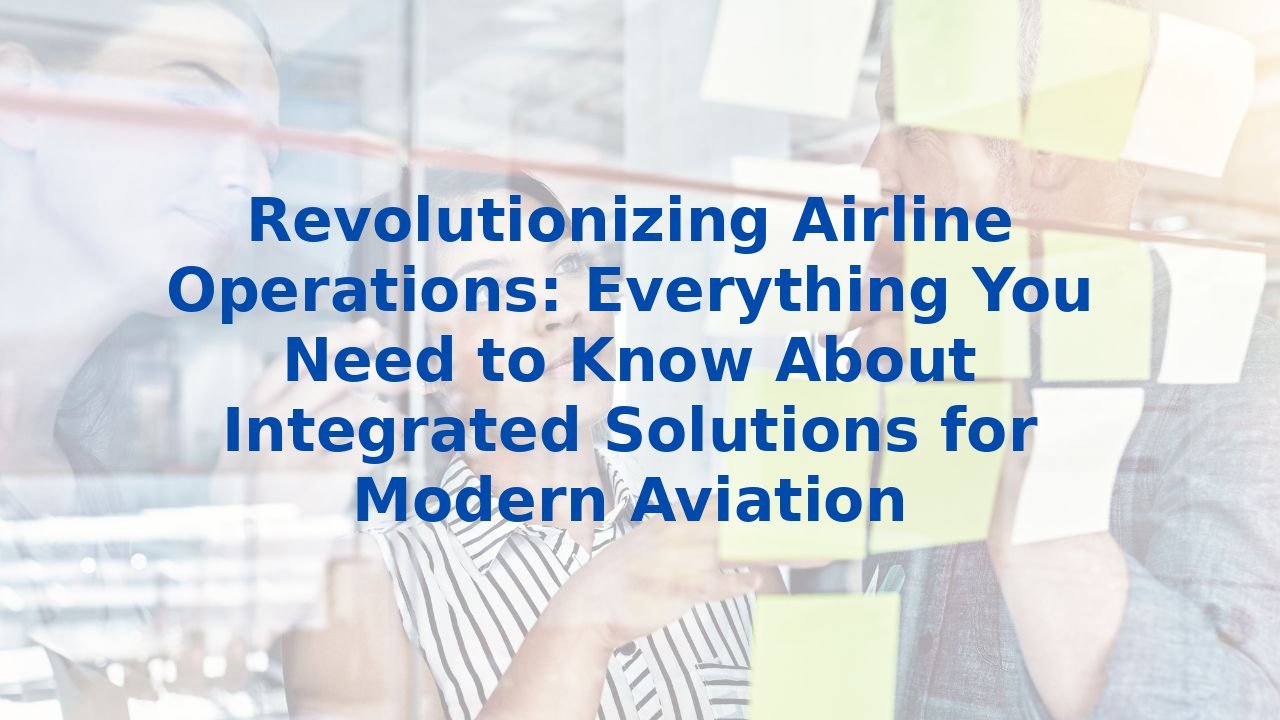Revolutionizing Airline Operations: Everything You Need to Know About Integrated Solutions for Modern Aviation
Revolutionizing Airline Operations: Everything You Need to Know About Integrated Solutions for Modern Aviation
The airline industry is undergoing a seismic shift as the embrace of integrated solutions powered by artificial intelligence (AI) charts a new course. The traditional paradigms of operation are being challenged, opening avenues for increased efficiency, enhanced customer experiences, and unrivaled agility. The future of aviation hinges on how well businesses adapt their processes to these advancements. Here’s everything you need to know about revolutionizing airline operations through integrated solutions.
1. Automating Repetitive Tasks
The repetitive nature of certain tasks in airline operations can stifle innovation and slow down progress. AI offers a powerful antidote by automating these routine functions. From processing bookings and managing baggage to responding to customer inquiries, AI can streamline operations, liberating employees to focus on more strategic initiatives.
Imagine a world where travelers receive immediate responses to their queries, where check-in processes are seamless, and baggage claims are efficiently resolved—all driven by AI algorithms. This automation not only reduces the margin for human error but significantly enhances the overall customer experience.
2. Supported Decision-Making
In the fast-paced environment of aviation, informed decision-making is paramount. AI thrives in this realm by analyzing vast troves of data at lightning speed. Whether it's assessing flight patterns, understanding passenger demographics, or evaluating financial forecasts, AI equips leaders with actionable insights that were previously obscured by the sheer volume of available information.
Data-driven decision-making empowers businesses to anticipate trends, manage resources more effectively, and mitigate risks proactively. Imagine predictive analytics enabling airlines to foresee shifts in demand and adjust staffing accordingly—that's the future that's already unfolding.
3. Enhancing Customer Service
Customer service is the lifeblood of the airline industry, and AI is redefining what exceptional service looks like. By leveraging chatbots and virtual assistants, airlines can provide personalized support around the clock. These tools are not just about resolving inquiries; they analyze customers' behavior and preferences to anticipate their needs.
“By proactively addressing potential issues, AI enhances the overall travel experience, turning challenges into seamless interactions.”
As customer interactions become more efficient, airline staff can devote their efforts to more complex customer needs, creating a balance that elevates service levels.
4. Optimizing Internal Operations
Behind the scenes, AI is leading a revolution in internal operations. From inventory management of aircraft parts to scheduling flight crews, the capabilities of AI streamline every process. By automating mundane tasks such as report generation and data analysis, airlines can optimize their internal workflows.
This not only reduces operational costs but enhances the ability to track the effectiveness of marketing strategies and operational initiatives. Real-time data insights transform decision-making into a dynamic practice rather than a tedious one.
5. Revising Existing Jobs
As AI takes center stage, job roles within the airline industry are being transformed rather than eliminated. While certain tasks may become automated, this evolution redefines roles to combine human insight with AI efficiency. For instance, customer service agents can evolve into travel consultants, providing value-added services that enhance customer loyalty.
By reassessing job functions, airlines can cultivate talent that aligns with this new technological landscape, fostering a culture where human creativity complements AI innovation.
Benefits of Training Employees for AI
The success of implementing AI in airline operations hinges on the skilled workforce equipped to work alongside these technologies. Comprehensive training programs are essential in nurturing employees’ proficiency in leveraging AI tools. Offering courses that focus on data analysis, problem-solving, and strategic thinking prepares staff to harness AI effectively.
By investing in employee training, airlines not only minimize the fear of technological replacement but also empower their workforce to contribute to innovative solutions. In an industry as dynamic as aviation, adaptability is key, and a well-prepared staff can drive the organization toward future successes.
Conclusion
The potential of AI in revolutionizing airline operations is remarkable. From automating tasks and enhancing decision-making to refining customer service and optimizing internal processes, the integration of AI fosters a more efficient and responsive business environment. As the aviation landscape transforms, airlines that prioritize training and embracing AI will not just survive—they will thrive, positioning themselves at the forefront of an industry marked by rapid evolution.
To further explore how to effectively equip your organization with AI skills, consider learning more about Complete AI Training. Investing in your workforce today paves the way for a brighter, more efficient tomorrow.



